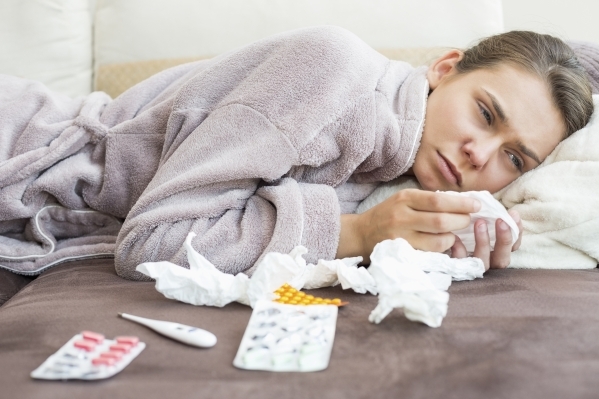Why do we get sick at the start of our vacations?
It's something just about everyone has wondered about at one time or another: Why does something — a cold, the flu, an allergy attack — always seem to hit on the first or second day of a long-awaited vacation?
The phenomenon has been dubbed "leisure sickness," and it's not a universally accepted diagnosis. Still, paying attention to a few simple measures can help to at least minimize the chances of an annoying illness derailing your holiday travel plans.
One explanation of leisure sickness holds that becoming sick while on vacation may be particularly common among persons with high-pressure or stressful jobs. In such persons, the thinking goes, such illnesses as headaches or cold- or flu-like symptoms can result from the body's inability to deal with an abrupt switch from the adrenaline-fueled workday to a more leisurely vacation-time vibe, compromising the body's immune system along the way.
Dr. Matthew Carlson, an assistant professor and assistant director of the family medicine residency program at Touro University Nevada College of Osteopathic Medicine, hasn't heard of leisure sickness, but he has heard of a similar malady dubbed "paradise syndrome."
That, he says, has been described as affecting "basically workaholics, people who are running at 110 percent, or trying to, all the time. Then, on weekends or when they take a vacation, when they're not working, they start to feel ill."
Maybe it's just coincidence. But Carlson says it also may have at least something to do with the health practices we do or don't follow in the days leading up to, and then during, our vacations.
"When we take a look at how we care for ourselves, sometimes we tend not to do the best job if we are looking at going on vacations," he explains.
"Say you're about to travel to Mexico. Most often, on the day you leave you're going to be more stressed because you're trying to get everything done," Carlson says.
You're probably not drinking as much water as you've become accustomed to at the office, leading to dehydration. And, with the stress of last-minute chores and packing, "you're probably not getting as much rest as before," Carlson says.
At the airport, you enter "an aluminum tube, breathing recycled air for four or five hours," all of it shared with a few hundred fellow travelers, he continues. Along the way, you've been touching surfaces — handrails, seatbelt buckles, doors — touched previously by scads of other people, not all of whom are necessarily cold- or flu-free.
During the flight, the dry, nonhumidified air in the airplane is drying out your mucous membranes, creating a hospitable environment for invading viruses and bacteria, Carlson says.
You're also not moving around as much, certainly in the plane and maybe even at your destination where your daily workout is abandoned and replaced with lolling on the beach or sitting around with family and friends. That can reduce the effectiveness of your lymphatic system, which is responsible for "getting immune cells all around your body," Carlson says.
When you arrive at your destination, you might be exposed to allergens that are unfamiliar to your body. Carlson notes that travelers' allergies also can be made worse by not remaining hydrated and breathing dry air.
The bottom line: Vacation may be a time when "you're not taking care of yourself," Carlson says, at least not to the extent you do when following your normal, nonvacation routine.
So minimizing the chances of contracting a vacation-time cold or illness begins by making sure that "you take care of yourself and are managing stress," Carlson says.
Wash hands frequently and try not to touch your eyes or nose. Saline nasal sprays can help to relieve dry membranes in the nose. Stay hydrated.
"Make sure you get adequate rest," Carlson says, and "exercise once in a while," being sure to incorporate movement and activity into your vacation plans.
Continuing to follow basic health practices, even while on vacation, often is, Carlson says, "stuff we forget about."
Contact reporter John Przybys at jprzybys@reviewjournal.com or 702-383-0280. Follow him on Twitter: @JJPrzybys






















